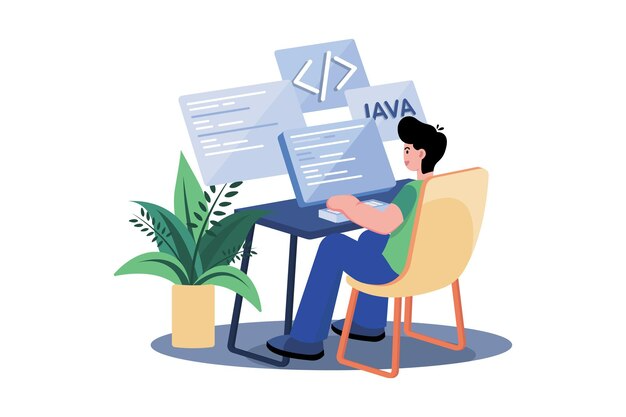- INTRODUCTION JAVA
- Java Syntax and Fundamentals
- Object-Oriented Programming (OOP)
- Data Structures
- Graphical User Interface (GUI) Development
- Advanced Java Concepts
- Software Development Life Cycle (SDLC)


Basic syntax and
variables
data types and operators
control statements
loops and arrays
Principles of OOP and classes
objects and inheritance
polymorphism and encapsulation
Arrays and linked lists
stacks and queues
trees and hash tables
Java Swing or JavaFX for creating desktop
applications with interactive interfaces.
Generics and lambda expressions,
streams and reflection
annotations and design patterns
including requirements analysis
design and coding
testing, and maintenance
Java is widely used because it is reliable and flexible. It’s great for building web apps, mobile apps, and software, making it one of the most popular programming languages in the world.
Haryana Institute of Information Technology (HIIT Ambala) provides the best Java courses in Ambala. The course covers everything from basic to advanced Java concepts and focuses on practical skills to ensure students are job-ready.
After completing the Java course, you can work as a Java Developer, Software Engineer, Web Developer, or Mobile App Developer. Java skills are in high demand in the tech industry, and employers actively seek these skills.
Yes, the Java course at HIIT Ambala is perfect for beginners. It starts with the basics and moves step by step, making it easy to understand and follow.
Haryana Institute of Information Technology (HIIT Ambala) provides a course that combines both theory and hands-on practice. Students get the chance to work on real-world projects, which gives them valuable experience that is highly appreciated by employers.
No, you don’t need prior programming knowledge. The Java course at HIIT Ambala begins with the basics and helps you build a strong foundation in Java programming.
Yes, the Java course includes practical projects that allow you to apply your knowledge to real-world problems. This helps you understand how Java is used in the tech industry.
The Java course at HIIT Ambala includes mock interviews and coding challenges to prepare you for technical interviews. You’ll be well-prepared for common interview questions and have the chance to practice your coding skills.
No, a degree is not mandatory. Many companies hire candidates with strong practical skills, portfolio projects, and certifications in Data Science.
Yes, after finishing the Java course, Haryana Institute of Information Technology (HIIT Ambala) provides a certificate that validates your Java skills and enhances your job prospects.
There are no specific prerequisites for joining the Java course at HIIT Ambala. The course is designed for all skill levels, so whether you're a beginner or have some programming knowledge, you can start learning Java with ease.